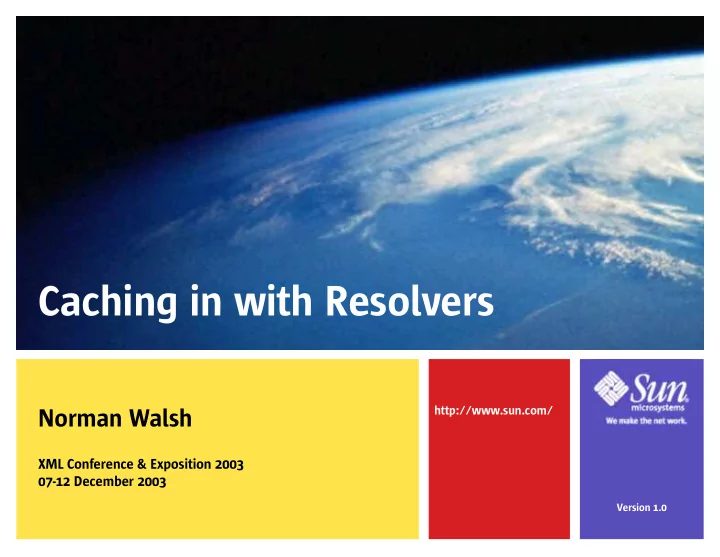

Caching in with Resolvers Norman Walsh http://www.sun.com/ XML Conference & Exposition 2003 07-12 December 2003 Version 1.0
Introduction • Using URIs • The Problem • Solutions • Catalog-based Resolution • Proxy Caches • Parting Thoughts and Q&A http://www.sun.com/ 2 / 47
Using URIs Relative URIs Absolute URIs on the Local File System Absolute URIs on the Network How do we use URIs to address resources? http://www.sun.com/ 3 / 47
Relative URIs • dbpoolx.rng • ../xml/docbookx.dtd • ../../xsl/html/docbook.xsl These are context dependent. http://www.sun.com/ 4 / 47
Absolute URIs on the Local File System • file:///c:/xml/docbook42/docbookx.dtd • file:///share/schemas/relax-ng/docbook/4.2/docbook.rng • file:///export/home/john/doctypes/xml/docbook/4.2/doc- bookx.dtd These identifiers are only useful (in general) on the system where they were created. http://www.sun.com/ 5 / 47
Absolute URIs on the Network • http://docbook.org/rng/4.2/docbook.rng • http://www.oasis-open.org/docbook/xml/4.2/docbookx.dtd • urn:publicid:-:OASIS:DTD+DocBook+XML+V4.2:EN • http://docbook.sourceforge.net/release/xsl/cur- rent/html/docbook.xsl These offer the most unambiguous identification. http://www.sun.com/ 6 / 47
The Problem In Theory… In Practice… Demo Therefore… An old chestnut: in theory, theory and practice are the same but in practice, they aren’t. http://www.sun.com/ 7 / 47
In Theory… Standards encourage us design for a perfect world. Namespace documents, schemas, stylesheets, and other files are identified by URIs on the global web where: • The network is universally available and • There is no latency http://www.sun.com/ 8 / 47
In Practice… • Networks go down • Firewalls and security measures interfere with access • Our machines are sometimes physically disconnected • Latency is sometimes significant http://www.sun.com/ 9 / 47
Demo Demo 1 http://www.sun.com/ 10 / 47
Therefore… • While it’s useful, interoperable, and important to identify documents with URIs on the global web, • It is convenient, sometimes necessary, to store representa- tions locally and • To access them transparently instead of “hitting the web” for them each time http://www.sun.com/ 11 / 47
Brute Force Brute Force Example (1) Example (2) http://www.sun.com/ 12 / 47
Brute Force The brute force “solution” is to edit every document so that it explicitly references local resources: • Replace absolute URIs to resources on the global web with absolute or relative references to URIs on the local file sys- tem • Do this every time you exchange documents with colleagues • (Hopefully you don’t need any digital signatures) http://www.sun.com/ 13 / 47
Example (1) <!DOCTYPE book SYSTEM "http://www.oasis-open.org/docbook/xml/4.2/docbookx.dtd"> <?xml-stylesheet href="http://www.example.org/styles/style.xsl" type="text/css"?> <book>…</book> Becomes <!DOCTYPE book SYSTEM "/path/to/docbookx.dtd"> <?xml-stylesheet href="/local/copy/of/style.xsl" type="text/css"?> <book>…</book> http://www.sun.com/ 14 / 47
Example (2) <xsl:stylesheet xmlns:xsl="http://www.w3.org/1999/XSL/Transform" xmlns:exsl="http://exslt.org/common" version="1.0" exclude-result-prefixes="exsl"> <xsl:import href="http://docbook.sourceforge.net/release/xsl/current/html/docbook.xsl"/> <xsl:import href="http://docbook.sourceforge.net/release/xsl/current/html/chunk-common.xsl"/> <xsl:include href="http://docbook.sourceforge.net/release/xsl/current/html/manifest.xsl"/> … Becomes <xsl:stylesheet xmlns:xsl="http://www.w3.org/1999/XSL/Transform" xmlns:exsl="http://exslt.org/common" http://www.sun.com/ 15 / 47
Example (2) (Continued) version="1.0" exclude-result-prefixes="exsl"> <xsl:import href="/local/copy/of/docbook.xsl"/> <xsl:import href="/local/copy/of/chunk-common.xsl"/> <xsl:include href="/local/copy/of/manifest.xsl"/> …
Catalog-based Resolution What Is It? Catalog History An XML Catalog Catalog Features Mapping External Identifiers Mapping URIs Chaining Catalogs Rewriting Delegation Extension Miscellany Catalog: Pro … http://www.sun.com/ 17 / 47
What Is It? • Explicit mapping from global identifiers to local identifiers • Maintained by hand (or by local system configuration, e.g., Debian) • Relies on a resolver in the application • The focus of this presentation is XML Catalogs , developed by the Entity Resolution Technical Committee at OASIS http://www.sun.com/ 18 / 47
Catalog History XML Catalogs… • Developed by the Entity Resolution Technical Committee at OASIS • Have the same semantics as SGML Open Catalogs, where appropriate • Support normatively only the SGML Open Catalog entries relevant to XML http://www.sun.com/ 19 / 47
An XML Catalog <?xml version='1.0'?> <catalog xmlns="urn:oasis:names:tc:entity:xmlns:xml:catalog"> <public publicId="-//OASIS//DTD DocBook XML V4.2//EN" uri="/share/doctypes/docbook42/xml/docbookx.dtd"/> <system systemId="http://www.oasis-open.org/docbook/xml/4.2/docbookx.dtd" uri="/share/doctypes/docbook42/xml/docbookx.dtd"/> <uri name="http://docbook.org/rng/4.2/docbook.rng" uri="schema/relaxng/docbook.rng"/> </catalog> http://www.sun.com/ 20 / 47
Catalog Features What do catalogs provide? They can… • Map external identifiers • Map URIs • Be chained together for modularity • Rewrite system identifiers and URIs • Delegate mapping to another catalog • Be extended http://www.sun.com/ 21 / 47
Mapping External Identifiers The “public” and “system” entries map external identifiers to local resources based on public and/or system identifiers. <public publicId="-//OASIS//DTD DocBook XML V4.2//EN" uri="/share/doctypes/docbook42/xml/docbookx.dtd"/> <system systemId="http://www.oasis-open.org/docbook/xml/4.2/docbookx.dtd" uri="/share/doctypes/docbook42/xml/docbookx.dtd"/> http://www.sun.com/ 22 / 47
Mapping URIs The “uri” entry maps one URI to another. <uri name="http://docbook.org/rng/4.2/docbook.rng" uri="schema/relaxng/docbook.rng"/> <uri name="http://docbook.sf.net/xsl/fo/docbook.xsl" uri="xsl/fo/docbook.xsl"/> <uri name="http://docbook.sf.net/bibl/bibl.xml" uri="file:/home/ndw/.bibliography.xml"/> <uri name="http://docbook.sf.net/images/draft.png" uri="xsl/images/draft.png"/> http://www.sun.com/ 23 / 47
Chaining Catalogs Catalogs can be chained together. For example, consider /etc/catalog.xml : <?xml version='1.0'?> <catalog xmlns="urn:oasis:names:tc:entity:xmlns:xml:catalog"> <nextCatalog catalog="/usr/share/docbook/4.2/catalog.xml"/> <nextCatalog catalog="/usr/share/html/4.01/catalog.xml"/> <nextCatalog catalog="/usr/share/entities/8879.1986/catalog.xml"/> </catalog> http://www.sun.com/ 24 / 47
Rewriting Rewriting is a convenient method of moving an entire tree <rewriteSystem systemIdStartString="http://www.w3.org/" rewritePrefix="/projects/w3c/WWW/"/> This entry would map: http://www.w3.org/2002/xmlspec/dtd/2.3/xmlspec.dtd to /projects/w3c/WWW/2002/xmlspec/dtd/2.3/xmlspec.dtd http://www.sun.com/ 25 / 47
Delegation Delegation turns control over to another catalog. <delegatePublic publicIdStartString="-//Example//" catalog="http://example.com/catalog.xml"/> (We’ll come back to this example later because the “http” URI in the catalog attribute is interesting.) http://www.sun.com/ 26 / 47
Extension The XML Catalog format is extensible. For example, an “suffix rewriting” extension: <catalog xmlns="urn:oasis:names:tc:entity:xmlns:xml:catalog" xmlns:sfx="http://nwalsh.com/xcatalog/1.0"> <sfx:systemSuffix suffix="docbookx.dtd" uri="/share/doctypes/docbook42/xml/docbookx.dtd"/> </catalog> This extension replaces any system identifier that ends in “ docbookx.dtd ” with the specified URI. http://www.sun.com/ 27 / 47
Miscellany • Relative URIs in the catalog are resolved against the current base URI • XML Catalogs support xml:base • Entries can be grouped for convenience http://www.sun.com/ 28 / 47
Catalog: Pro Catalogs can be: • Easily configured without privileged access to the machine • Changed on a per-application basis, if necessary • Managed automatically by install processes • Configured manually, without every having network access to the resources managed • Extended by resolvers http://www.sun.com/ 29 / 47
Recommend
More recommend